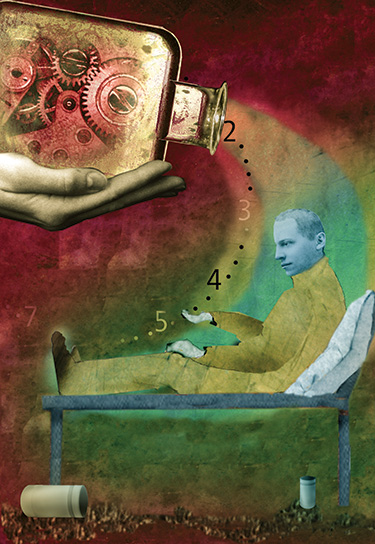 An answer to teen drug use isn’t quite as simple as “just say no.” Many teenagers know they are supposed to say no to tobacco, alcohol and other drugs but they don’t know why. Addiction is multi-faceted and complex, so understanding its neurophysiological aspect is essential to putting together a complete picture.
An answer to teen drug use isn’t quite as simple as “just say no.” Many teenagers know they are supposed to say no to tobacco, alcohol and other drugs but they don’t know why. Addiction is multi-faceted and complex, so understanding its neurophysiological aspect is essential to putting together a complete picture.
UW School of Nursing researcher Susanna Cunningham, ’69, ’78, and her team received more than $1 million from the National Institute on Drug Abuse to give young people an opportunity to really understand how addiction develops so they can make informed choices in their lives. The product is a university level web-based biology course called Online Neuroscience Education About Drug Addiction.
Cunningham, professor of Biobehavioral Nursing and Health Systems, is the principal investigator on the project, which will use the science of drug abuse and addiction as a context to teach core biology concepts that also align with national and state science education standards.
The project is a collaboration between the School of Nursing, the Biology Department, UW Educational Outreach and the Puget Sound Educational Service District.
Another goal of the project is to establish a cadre of high school teachers who really know their stuff when it comes to the science of addiction. In the past three years, 33 classroom teachers from private and public schools throughout Washington have been trained to disseminate this material. In addition to the course offering and teacher training, the researchers will also evaluate the program’s effectiveness, using surveys of content and attitudes.
The high-school juniors and seniors who sign up for the course will learn the biology of addiction and drug abuse, a subject many high-school students find interesting. The course also comes with extra perks: Students can earn up to five credits through the University of Washington in the High School program at reduced cost. The course also should pique interest about career opportunities in science.
The UW team adapted a curriculum taught by Linda Martin-Morris, principal lecturer in Biology, who has extensive experience teaching UW undergraduates how drug use affects neurological function. Budget cuts axed the Biology 100 course she taught but the germ of her curriculum provided a sound basis for the high school offering.
“Students learn about the brain’s reward system, how neurotransmitters work. We have worms we use and they can do brain science with sheep,” Cunningham says. “Sometimes Linda will do a presentation and bring a human brain to talk about.”
Cunningham has another project funded by the National Institutes of Health. It’s a Blueprint for Neuroscience Award given to improve neuroscience understanding and career interest in educational settings across the country. The project, called How Do I Learn, is about metacognition—thinking about thinking. Cunningham and her team want to teach students and their teachers about how the brain actually learns.
“Shouldn’t people know what happens when they learn?” Cunningham asks. “There is a lot of pseudo-science out there about learning and the brain. We wanted to get the pseudo-science out of it and to teach what we really do know about the brain.”
Last summer, 25 teachers came to the Seattle campus and spent a week talking and learning about the brain and “the challenge cycle,” which is a way of posing questions. “This summer we’re talking about attention. What is it? What happens in the brain when we are paying attention?” Cunningham says. The 30 teachers who came to the UW this summer took what they learned back to their schools to teach their students.
Cunningham began to pursue educational partnerships almost 30 years ago for two reasons. First, she wanted youngsters to think about nursing as a science career. “They used to say in K-12 if you’re smart, you should be a doctor. My response is ‘you should be a nurse.’ Nursing is more fascinating,” she says. The second reason was that she wanted people to understand why animal research is so important to researchers working to answer scientific questions.
Cunningham remains committed to working collaboratively with educators as well as other UW faculty and staff. She says getting the word out about brain science and addiction is important for everyone given the problems addictions cause in communities and families.